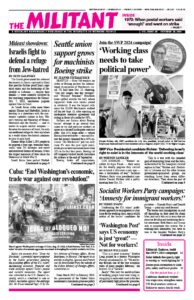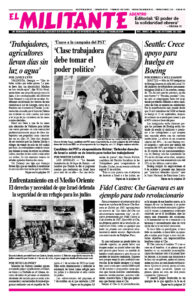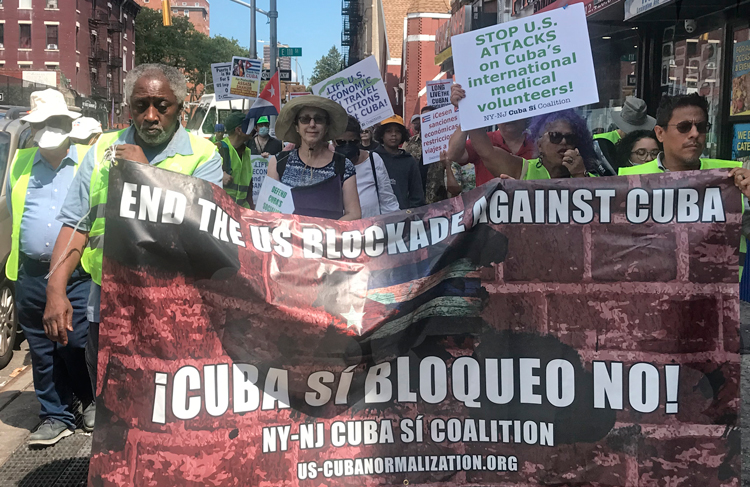Below are excerpts from “Drop the Blockade!” a powerful report prepared by the Cuban government detailing the punishing effects of the U.S. rulers’ decadeslong economic, financial and trade embargo against Cuba’s people and socialist revolution. The report was submitted to the U.N. General Assembly, which is scheduled to vote on Cuba’s resolution against the embargo Oct. 30. It was released Sept. 12 by Cuba’s Minister of Foreign Affairs, Bruno Rodríguez, in Havana. The report in its entirety in English, Spanish and French can be downloaded from the website of the Cuban Ministry of Foreign Affairs, cubaminrex.cu.
From March 2023 to February 2024, the government of the United States maintained a maximum pressure policy against Cuba and continued to fully implement the economic, commercial and financial blockade, which is the fundamental pillar of that policy. Unilateral measures remained unchanged, with a stronger impact on Cuba’s economy and people. Such measures have continued to replicate and aggravate the demolishing effects of this unilateral coercive system, the most wide-ranging and longest-lasting in history. …
In the course of last year, the US government has upheld the laws and provisions related to the blockade against Cuba as well as the traditional actions to ensure their implementation, aimed at pursuing the historical goal of depressing the Cuban economy and workers’ salaries; generate material scarcities and damage public services; provoke dissatisfaction and desperation among the population and subvert the legally established constitutional order. This kind of behavior has been described in several official documents of the US government which have been declassified, such as the internal Memorandum drafted by Deputy Assistant Secretary of State Lester Mallory on April 6, 1960, which stated as follows:
“Every possible means should be undertaken promptly to weaken the economic life of Cuba … a line of action which, while as adroit and inconspicuous as possible, makes the greatest inroads in denying money and supplies to Cuba, to decrease monetary and real wages, to bring about hunger, desperation and overthrow of government.” …

All the difficulties faced by the Cuban society are not exclusively due to the blockade, but it would be untrue for anyone not to recognize the blockade as the main obstacle to our development. No country in this world, not even those whose economies are much more prosperous and robust than the Cuban economy, would be able to cope with such a ruthless, asymmetric and protracted aggression without a high cost on the living standards of their peoples, their stability and social justice.
That cost is being evidenced today in the shortages suffered by Cuban men and women, which include foodstuffs, medicines, fuels, means of transportation; as well as the deterioration of other basic services.
The US government cleared any doubt that might exist regarding the cruel and genocidal nature of the blockade when it chose the worst moment of the COVID-19 pandemic to impose additional coercive measures on all Cubans. It strengthened the ban on Cuban imports of several commodities, including ventilators; applied measures that affected the scaling-up of the Cuban vaccines against the virus and managed to prevent the import of oxygen from third countries. It refused to lift, even temporarily, the measures against Cuba so that the country could cope with the pandemic, as it did to other nations.
From March 1st, 2023 to February 29, 2024 the blockade caused material damages to Cuba estimated at USD 5,056,800,000, which represents an increase of USD 189,800,000 as compared to the figure that appears in the previous Report.
All of the above reflect the strengthened impact of the blockade on Cuban exports, particularly in the tourism sector; the ruthless persecution of the country’s financial and banking operations; as well as the comprehensive damages caused to Cuba’s entrepreneurial system, production and the services provided to the population. …
Between March 2023 and February 2024, the US government continued its pursuit of fuel supplies to Cuba, the possibility of filing lawsuits in US courts under Title III of the Helms-Burton Act, and the smear campaign against the medical cooperation programs that the island carries out in numerous countries. Furthermore, it set out to curtail the recovery of the Cuban tourism sector hardest hit during the COVID-19 pandemic. These measures aim at dealing a mortal blow to the country’s main sources of income.
The financial persecution has been further reinforced by the arbitrary inclusion of Cuba in the State Department’s unilateral list of alleged countries sponsoring terrorism. It was a measure imposed, with no justification or evidence, by the Republican administration of President Donald Trump, just nine days before leaving the White House. The current President could reverse it with just a signature. The fact that the US government recently acknowledged that Cuba fully cooperates in the fight on terrorism, makes keeping Cuba in this spurious list even more absurd and unjustifiable. …
Cuba maintains its willingness to build a civilized and respectful relationship with the government of the United States, despite our differences. We will remain open to exchange and collaboration with all counterparts and partners in US society who wish to work with Cuba for better relations.
As President Miguel Díaz-Canel Bermúdez has expressed, Cuba is prepared to continue facing the blockade and resist with creativity to overcome the injustice imposed upon us.
We will not stop denouncing the blockade, with the hope that this criminal policy will be eliminated once and for all. Present and future generations of Cubans have the right to live and prosper in a Cuba with no blockade.


